|
|
|
Sort Order |
|
|
|
Items / Page
|
|
|
|
|
|
|
| Srl | Item |
| 1 |
ID:
178085


|
|
|
|
|
| Summary/Abstract |
The Women, Peace and Security (WPS) agenda is a diverse field of practice comprised of numerous actors, activities and artefacts. Conventional accounts of WPS development and implementation tend to reproduce a narrative that positions states located in the global North as ‘providers’ of WPS, and those in the South as ‘recipients’. This assumption in turn prescribes, and proscribes, forms of WPS engagement and has a constitutive effect on the agenda itself, as shown by post- and de-colonial analyses of the WPS agenda. This article seeks to explore the WPS practices of a group of states that in many ways challenge these North/South and provider/recipient binaries by explicitly positioning themselves as operating beyond and across them: the BRICS countries, comprised of Brazil, Russia, India, China and South Africa. In this article, we explore how constructions of conflict within the WPS practices of BRICS states relate to the acknowledgement of, and commitment to, the agenda more broadly. We ultimately argue that the BRICS' commitment to the WPS agenda is driven more by identity-making geopolitical considerations, including geostrategic interests, than a politics of peace.
|
|
|
|
|
|
|
|
|
|
|
|
|
|
|
|
| 2 |
ID:
178083
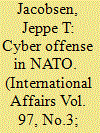

|
|
|
|
|
| Summary/Abstract |
As a response to the Russian invasion of Crimea, NATO returned to the core military concepts of deterrence and collective defence. This NATO adaption has recently come to include attempts to integrate offensive cyber effects into NATO force structure and response doctrine. The article argues—counter to what is publicly declared—that such an integration does little to strengthen NATO's deterrence posture and is unlikely to deter non-military, hybrid cyber activity below the threshold of collective defence. The article identifies several practical challenges to the current integration effort, which include the temporal dimension of developing exploits, battle damage assessment and deconfliction. With these challenges in mind, the article suggests that deploying minor and less resourceful cyber effects that cause persistent ‘cyber annoyances’ holds an unappreciated potential as they can drain opponent resources, disturb vital IT-systems and complicate decision-making. The article ends by arguing that NATO should not adapt its collective defence clause to cyberspace. A more active NATO in cyberspace risks undermining the cyber-intelligence norm that so far has prevented escalation and thereby increasing the likelihood that Russia misinterprets intelligence and active cyber defence activities as military preparation, armament or an attack in the making.
|
|
|
|
|
|
|
|
|
|
|
|
|
|
|
|
| 3 |
ID:
178091


|
|
|
|
|
| Summary/Abstract |
This article examines what contemporary elites think about global governance and what these attitudes might bode for the future of global institutions. Evidence comes from a unique survey conducted in 2017–19 across six elite sectors (business, civil society, government bureaucracy, media, political parties, research) in six countries (Brazil, Germany, the Philippines, Russia, South Africa, the United States) and a global group. Bearing in mind some notable variation between countries, elite types, issue-areas and institutions, three main interconnected findings emerge. First, in principle, contemporary leaders in politics and society hold considerable readiness to pursue global-scale governance. Today's elites are not generally in a nationalist-protectionist-sovereigntist mood. Second, in practice, these elites on average hold medium-level confidence towards fourteen current global governance institutions. This evidence suggests that, while there is at present no legitimacy crisis of global governance among elites (as might encourage its decline), neither is there a legitimacy boom (as could spur its expansion). Third, if we probe what elites prioritize when they evaluate global governance, the surveyed leaders generally most underline democracy in the procedures of these bodies and effectiveness in their performance. This finding suggests that, to raise elites' future confidence in global governance, the institutions would do well to become more transparent in their operations and more impactful problem-solvers in their outcomes.
|
|
|
|
|
|
|
|
|
|
|
|
|
|
|
|
| 4 |
ID:
178080
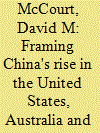

|
|
|
|
|
| Summary/Abstract |
Optimism about China's rise has in recent years given way to deep concern in the United States, Australia and the United Kingdom. Drawing on an original set of interviews with China experts from each country, and an array of primary and secondary sources, I show that shifting framings of China's rise reflect the dynamics of the US, Australian and UK national security fields. The article highlights three features specifically: first, the US field features a belief that China's rise can be arrested or prevented, absent in Australia and the UK. I root this dynamic in the system of professional appointments and the intense US ‘marketplace of ideas’, which gives rise to intense framing contestation and occasional sharp frame change. I then identify the key positions produced by each field, from which key actors have shaped the differing interpretations of China and its meaning. The election of Donald Trump, a strong China-critic, to the US presidency empowered key individuals across government who shifted the predominant framing of China from potential challenger to current threat. The smaller and more centralized fields in Australia and Britain feature fewer and less intense China-sceptical voices; responses have thereby remained largely pragmatic, despite worsening diplomatic relations in each case.
|
|
|
|
|
|
|
|
|
|
|
|
|
|
|
|
| 5 |
ID:
178087


|
|
|
|
|
| Summary/Abstract |
Iran's strategy with respect to Saudi Arabia is a key factor in the complex balance of power of the Middle East as the Iranian–Saudi rivalry impacts the dynamics of peace and conflict across the region from Yemen to Syria, Lebanon, Iraq and Bahrain. What is Iranian strategic thinking on Saudi Arabia? And what have been the key factors driving the evolution of Iranian strategy towards the Kingdom? In what marks a substantive shift from its previous detente policy, we argue that Tehran has developed a new containment strategy in response to the perceived threat posed by an increasingly pro-active Saudi Arabia in the post-Arab Spring period. Incorporating rich fieldwork and interviews in the Middle East, this article delineates the theoretical contours of Iranian containment and contextualizes it within the framework of the Persian Gulf security architecture, demonstrating how rational geopolitical decision-making factors based on a containment strategy, rather than the primacy of sectarianism or domestic political orientations, shape Iran's Saudi strategy. Accordingly, the article traces Iranian strategic decision-making towards the Kingdom since the Islamic Revolution of 1979 and examines three cases of Iran's current use of containment against Saudi Arabia in Syria, Yemen and Qatar.
|
|
|
|
|
|
|
|
|
|
|
|
|
|
|
|
| 6 |
ID:
178082


|
|
|
|
|
| Summary/Abstract |
The convergence of the life sciences with the information and computing sciences is beginning to generate novel security vulnerabilities. As scientific and technological advances occur, new security vulnerabilities are discovered and new methods for exploiting those vulnerabilities are developed. Novel cyber-biological capabilities are likely to enable technologically sophisticated states to develop new methods of grey zone warfare. This article provides context to this multidisciplinary area of research by reviewing the emerging field of cyberbiosecurity for its relevance to developments in grey zone warfare. This article then analyses two long-term trends that have influenced the development of contemporary cyber-biological capabilities. These two trends are advances in novel uses of biology and advances in computing, automation and biodesign. The capability to exploit vulnerabilities unique to the links between cyber and biological systems differs significantly from previous security concerns noted for biotechnology and the life sciences. Scholars and practitioners of international relations will need to develop an understanding of engineering biology and the bioeconomy in order to forecast methods of grey zone manoeuvre that rely on cyber-biological capabilities. This article offers an entry point for the scholar and practitioner so that they may bring their own disciplinary lens to the issue of grey zone ambiguity and cyberbiosecurity.
|
|
|
|
|
|
|
|
|
|
|
|
|
|
|
|
| 7 |
ID:
178088


|
|
|
|
|
| Summary/Abstract |
In its Eurasian diplomacy toward Russia and China, India has preferred to engage these states bilaterally and through the Brazil–Russia–India–China–South Africa (BRICS) and Shanghai Cooperation Organization (SCO) multilateral alignments. By contrast, India views the Russia–India–China (RIC) triangle as a less effective mechanism. However, despite its ongoing militarized crisis with China in the spring/summer of 2020, India surprisingly agreed to participate in a meeting of RIC foreign ministers and initiate RIC defence ministers' engagements. India also initiated the revival of RIC summits in 2018. This article analyzes the drivers for India's recent shift toward enhancing RIC. Drawing upon Indian policy statements and alignment documents, the article firstly argues that India generates policy agenda overlaps across RIC, BRICS and SCO, which facilitate forum-shopping. Introducing the case-study of Indian counterterrorism diplomacy across the three alignments, the article secondly argues that Indian dissatisfaction with its progress in advancing a security policy agenda within one grouping leads it to refocus on building this agenda in alternative alignments. This article contributes to conceptualizing multi-alignment management, while providing new insights into Indian relations with Russia and China within multilateral institutions and diplomacy in the era of regime complexity.
|
|
|
|
|
|
|
|
|
|
|
|
|
|
|
|
| 8 |
ID:
178086


|
|
|
|
|
| Summary/Abstract |
Focusing on the politics of sectarianism in the Middle East after the Arab uprisings, this article advances two main claims. First, it identifies the current climate of insecurity in the region amid major geopolitical shifts as a key condition that allows political leaders to present sectarian identities as being under (existential) threat. However, a heightened sense of insecurity not only acts as an enabling condition but is also the outcome of these sectarian securitization strategies. The ‘politics of fear’ may thus trigger a self-sustaining mechanism, or a vicious cycle. Second, as sectarian securitization has intensified in Israel since the early 2000s, the article discusses the vicious cycle of securitized sectarianism in the case of Israel in a comparative perspective. By drawing the attention to insecurity (or the sense thereof) as a key enabling condition against the backdrop of major disruptive events, and by bringing the case of Israel into the picture, the article contributes to our understanding of the current structure of regional politics in the Middle East. It concludes by reflecting on the impact of sectarian securitization on the region's conflict potential and the comparability of the Israeli case with those of other states in the region.
|
|
|
|
|
|
|
|
|
|
|
|
|
|
|
|
| 9 |
ID:
178079


|
|
|
|
|
| Summary/Abstract |
Previous explanations on China's counterterrorism strategy have highlighted the results of China's strategy of repression in Xinjiang, the historical antecedents and institutional foundations of its counterterrorism policies, as well as international and domestic sources of China's counterterrorism strategy. While acknowledging the importance of all these dimensions, this article draws attention to a largely neglected feature of China's counterterrorism strategy: the Chinese party-state's social engineering of Xinjiang. Building on Maoist-era practices such as the mass line and the ‘friend vs. enemy’ binary, the Communist party under Xi Jinping has integrated surveillance technologies as part of its strategy of preventive counterterrorism and ‘de-extremization’. This article argues that the Chinese party-state's embrace of modern technologies, a weak liberal tradition in China, Xi Jinping's rise to power in late 2012, and the appointment of Chen Quanguo as Xinjiang's party-secretary in 2016, provides the socio-political background for the intensification of securitization, surveillance and introduction of ‘re-education and training centres’ in Xinjiang. Surveillance technologies now complement collective, face-to-face methods of surveillance and Maoist-era techniques of mass mobilization, enabling the Chinese party-state to govern and manage the biopolitical spaces of Uyghurs with greater intensity, according to the state's precise norms. The legalization and institutionalization of ‘de-extremization’ has also led to the shift from mass ‘de-extremization’ propaganda to ‘drip-irrigation’ ideological and political re-education of individuals deemed at risk of extremism. The result is an increased capacity by the Chinese party-state to surveil and control the region, and to more effectively negate the possibility of individual resistance.
|
|
|
|
|
|
|
|
|
|
|
|
|
|
|
|
| 10 |
ID:
178089


|
|
|
|
|
| Summary/Abstract |
By applying the Multiple Streams Approach (MSA) developed by Kingdon and adapted to EU policy-making, this article explores a new analytical lens that provides a more substantiated insight into the role of the High Representative for Foreign Affairs and Security Policy (HR) in the policy-making process. According to the MSA, policy change happens when policy entrepreneurs successfully explore a window of opportunity that opens in the problems or policies stream. Applying a single case-study approach, this article argues that it was the entrepreneurship of HR Federica Mogherini that coupled problems, politics and policies streams which presented themselves between 2014 and 2015, made use of the window of opportunity, and pushed for policy change in EU's foreign and security policy. By finding observable evidence for the HR's deployment of entrepreneurial strategies during the drafting and implementation of the European Union's Global Strategy, this contribution unpacks Mogherini's footprint in the recent progress. The conceptualization of the HR office-holder as a policy entrepreneur lets us systematically investigate their agency and impact on the policy change within the existing formal constraints, and thus it paves a way towards a more fruitful research direction regarding the HR's role than the concept of the constrained agent that is dominant in the literature. More broadly, since the office-holder can be perceived as a supranational agent that is dependent upon an intergovernmental system for its mandate, by examining its entrepreneurial strategies this article offers insights on the role of supranational agents beyond the EU context, i.e. within UN and NATO.
|
|
|
|
|
|
|
|
|
|
|
|
|
|
|
|
| 11 |
ID:
178078
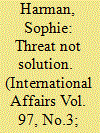

|
|
|
|
|
| Summary/Abstract |
COVID-19 has led to long overdue visibility of the gendered determinants and impacts of health emergencies and global health security. This article explores why gender was neglected in previous health emergencies, what led to change in visibility of gender issues during the first six months of the COVID-19 pandemic, and the implications of such change for understanding the relationship between gender and global health security. The article explores the question of neglect by drawing on original research into the 2014–16 Ebola outbreak in Sierra Leone, its aftermath and implications for future pandemic preparedness. The article then looks in detail at the research efforts, funding, epistemic community activism and impact of COVID-19 to explain why gender received high profile political attention and acknowledgment. The article argues that the change in visibility, research and advocacy around gender equality during the COVID-19 outbreak does not demonstrate an advancement in gender equality in global health. To the contrary, such visibility reinforces the inherent problems of global health security evident in the 2014–16 Ebola outbreak that create and reproduce binaries of neglect and visibility, and hierarchies of the global health issues that matter, the people that matter and the women that matter. What unites neglect and visibility of gender in global health security is that gender is understood as solution rather than threat. Combined these factors make gender equality incompatible with global health security.
|
|
|
|
|
|
|
|
|
|
|
|
|
|
|
|
| 12 |
ID:
178090
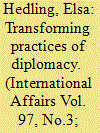

|
|
|
|
|
| Summary/Abstract |
This article explores the transformative role of practices of countering digital disinformation in European Union diplomacy. It argues that an overlooked dimension of the change brought by the rise of digital disinformation is located in the emergence of everyday countering practices. Efforts to counter disinformation have led to the recruitment of new actors with different dispositions and skill sets than those of traditional diplomats and state officials in diplomatic organizations such as the European External Action Service. Focusing on the countering efforts by the East StratCom Task Force, a unit introduced in 2015, the article argues that the composition of actors, the task force's practices and the reorientation in audience perception it reflected, contributed significantly to institutional transformation. Drawing on 23 interviews with key actors and building on recent advancements in international practice theory, the article shows how change and transformation can be studied in practices that have resulted from digitalization in international politics. The article thus contributes to an increased understanding of the digitalization of diplomacy in which new practices can emerge from both deliberate reflection and experimentation.
|
|
|
|
|
|
|
|
|
|
|
|
|
|
|
|
| 13 |
ID:
178081
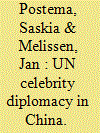

|
|
|
|
|
| Summary/Abstract |
This article examines Chinese celebrities' UN-affiliated Weibo activism in the context of China's increasing engagement in the United Nations, which coincides with a shrinking domestic public sphere under Xi Jinping's leadership. Our article sheds light on how Chinese celebrity diplomacy is balancing contradictory expectations by the UN, the Chinese party-state and the domestic public in China. In doing so, we offer an important conceptual update of the western-centric literature on ‘celebrity diplomacy’, which focuses mostly on celebrity politics instead of diplomacy and tends to neglect the digital sphere. Based on a combined qualitative and quantitative approach, we draw fresh conclusions from nine Chinese celebrities' communication on Weibo since 2013. Our research covers the years marking China's growing self-confidence and a more assertive Chinese diplomatic style in global affairs. Although accredited by the UN, on balance Chinese celebrities' activism has become more symbolic than real, and as a rule aligned with the Chinese leadership's domestic and international ambitions. At a time of greater Chinese global activism, we are sensitive to the policy implications of Chinese celebrities' engagement on the cusp of the political and diplomatic spheres.
|
|
|
|
|
|
|
|
|
|
|
|
|
|
|
|
| 14 |
ID:
178084


|
|
|
|
|
| Summary/Abstract |
The frames of counterterrorism and countering violent extremism are increasingly shaping much international engagement in Mali. In this environment, women's contributions are often reduced to their peacemaking potential. This article studies how the UN policy agendas on Women, Peace and Security (WPS) and Preventing and Countering Violent Extremism (P/CVE) are translated in discourses on P/CVE in Mali. It draws on feminist and postcolonial scholarship to develop a framework for analysing how local intermediaries in norm translation engage in ‘discursive practices of re-presentation’ and conducts a discourse analysis of interviews with Malian civil society and government representatives. The analysis finds that a re-presentation of women as security actors, constructed as an extension of their roles as peacemakers, dominates the discourse. I use the term ‘new security actors’ to describe the dominant re-presentation of women that emerges in this context: a woman who will contribute to preventing radicalization and violent extremism by influencing, counselling, and/or informing on her family or community members. ‘New security actors’, however, emerges as a problematic re-presentation of women which emphasizes traditional gender roles and potentially exposes women to risks, and in many ways seem to contradict much of the normative aspirations of the WPS agenda.
|
|
|
|
|
|
|
|
|
|
|
|
|
|
|
|
|
|
|
|
|